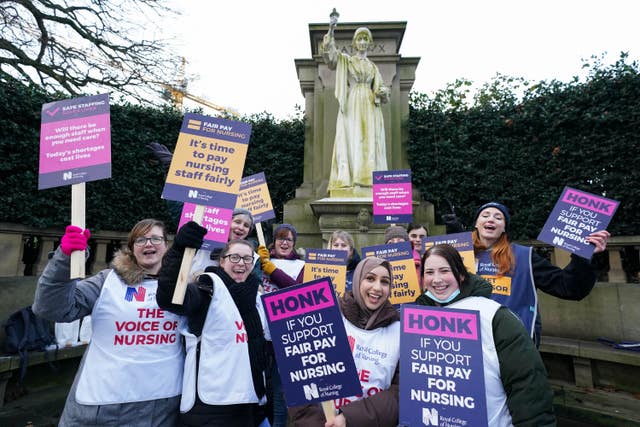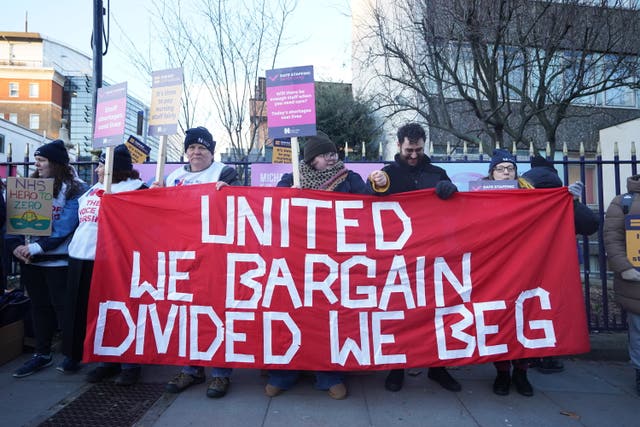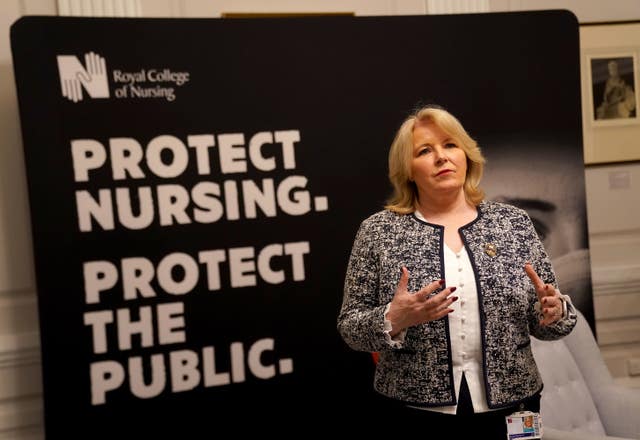
James O'Brien 10am - 1pm
18 January 2023, 13:04

Thousands of nurses are on strike at 55 NHS trusts in England in a dispute over pay.
An intensive care nurse has broken down in tears describing how she can “barely make ends meet” as thousands of nurses across England strike over pay.
Nav Singh, 38, said she is struggling to pay bills after working in the NHS. She arrived in London from Canada seven years ago, where she was also a nurse.
Speaking from the picket line outside King’s College Hospital in south-east London, she held a sign that reads: “You’re killing me Rishi. Fair pay now”.
She told the PA news agency: “It’s not feasible to take pay cut after pay cut after pay cut.
“The people at the top taking more and more for their pockets, for their businesses, for their friends, for their profits, while the people, the majority of people, suffer – and that includes patients and staff nursing.”
Apologising for becoming emotional as she wept, she said: “It’s heartbreaking.
“It’s a job that I love but I need to pay my bills.
“Nursing students don’t want to be nurses, experienced nurses are leaving, there will be no-one left and I don’t blame them. But I can’t imagine doing anything else.

“I’m living effectively pay cheque to pay cheque, can barely make ends meet, and I’m a senior nurse.
“When junior nurses come in with debt now that they weren’t necessarily accruing before … what kind of life can you have?”
Meanwhile, clinical nurse specialist Liz Wilson said she “breaks” herself every day to try to give patients the care they need.
Also speaking outside King’s where she works, she told PA: “What I would like to give patients tomorrow I can’t give for many many months, and we need to change that.
“When people need us we need to be there, not be putting them on a waiting list for up to a year for them to be able to get what they need.
“I break myself on a daily basis to try and keep up with the workload and to try and give the patients what they need, and I go home every day feeling as if I haven’t achieved that, despite the fact that I’ve worked above and beyond the time that I am paid to be there.”

The 37-year-old from Kent said she has worked “proudly and passionately” in the NHS for 13 years.
Asked how her day-to-day life outside of work has been affected, she said: “What day-to-day life outside of work? “Nursing… it is a job for life, it’s a vocation, but I feel as if there isn’t much time for much else.”
Meanwhile, next to the Florence Nightingale statue in Derby’s London Road, around a dozen nurses were at the Royal College of Nursing picket line first thing on Wednesday morning.
Several members of the public beeped their horns, as well as Royal Mail workers and a paramedic driving past.
Rachel Bosworth, who has worked for Derbyshire Community Health Services NHS Foundation Trust since 2008, said: “I’ve basically not had my central heating on and just had a fire.
. @patcullen9 : 'People aren’t dying because nurses are striking. Nurses are striking because people are dying.'
Patient safety is at the heart of why we're striking across England today and tomorrow.
Read more. #FairPayForNursing #RCNStrike https://t.co/T90Enpksyz
— The RCN (@theRCN) January 18, 2023
“It’s not desperate but I’ve done that because I know my bills will go through the roof, and everyone has to cut their cloth.
“A lot of people have voted to strike, but haven’t come out to strike as they can’t financially afford to lose a day’s pay, and that is unfortunate in itself and gives an indication as to how people are struggling.”
Rachel Morris, a regional officer for the RCN, has been a nurse for 30 years and was also on the Derby picket line.
She said several employers are now opening their own foodbanks to support staff, or directing them to external support.
Ms Morris added: “What we have seen since the pandemic is the pressure on staff is still there, there are gaps in rotas, a lot of nurses are leaving the profession and choosing to take a slight pay cut of £2 or £3 an hour to go and work in a supermarket because they can see the benefit of not having the stress and burnout of working in this profession.
“Staff are feeling the hit in their pockets. We know that our members are going to food banks, we know they can’t afford (shoes and clothes for their children), or afford a small break away to treat their families.”

She added: “It changes minute to minute (whether a patient will get care). Nurses are feeling very frustrated that they can’t give the care they want to give.
“They are having to do the bare minimum to keep patients safe because they don’t have time to do the nicer stuff and holistic care that really is very valuable to patients.”
Kaleb Fowkes, a 20-year-old history student at De Montfort University in Leicester, is from Derby and was at the RCN picket line to show solidarity with striking nurses.
He said: “I support the right to strike, I support nurses on strike, and personally they have been very useful to me as I dislocated my knee not too long ago and they were great, so I am showing my appreciation back.
“It’s important to show they’re not alone.”